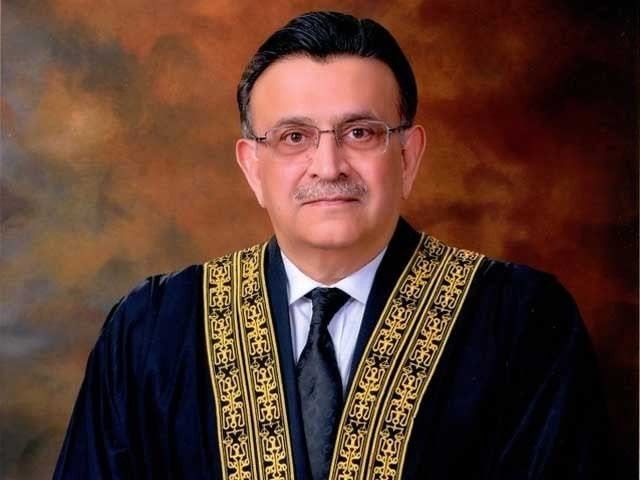PBC member in JCP worried over audio release
In his letter to CJP, Akhtar Hussain calls for changes in commission’s rules

Pakistan Bar Council (PBC) representative in the Judicial Commission of Pakistan (JCP) Akhtar Hussain has expressed his concerns over releasing the audio recording of the body's meeting without taking all its members on board.
“I have read the various letters of Mr Justice Qazi Faez Isa, Mr Justice Sardar Tariq Masood, Mr Justice Sajjad Ali Shah and the Attorney General for Pakistan Mr Ashtar Ausaf, and the two Supreme Court press releases on this subject and it is with considerable regret I am compelled to write this letter too,” the PBC representative wrote to the CJP Umar Ata Bandial, who is also the JCP chairman.
He added that in the first place, he felt that the writing of such letters and the issuance of press releases and audio proceedings of the commission’s meeting should not have been necessary.
“If the meeting of 28 July had not been abruptly terminated and a formal vote and final decision been recorded in the minutes at the end of the meeting – this occasion may not have arisen. Under all circumstances, it is essential that meetings of the commission end with a formal vote-taking as it is entirely possible that one or more members of the commission may change their minds after listening to their colleagues. This applies both to any nominations fielded and any other matters discussed in the meeting,” he further wrote.
“I note the regret expressed by Justice Sajjad Ali Shah that certain discussion that took place in the Judicial Commission have had [an] effect of harming the reputation of judges concerned. It is exactly for that reason the deliberation of Judicial Commission are confidential to strike a balance between desire for free and frank exchange of views regarding candidates whilst protecting the reputation of those who are discussed. As such I feel it was all the more necessary to consult with all members of the judicial commission before deciding to release the audio recording in relaxation of the rules. Perhaps had such consultation been held, it would have been possible to issue a consensus minutes of the meeting recording the exact positions of the members to the majority and minority without delving into unnecessary details and leaving no room for issuance of the audio record,” he added.
Read Unprecedented: CJP releases audio of JCP meeting
Akhtar further wrote that the attorney general for Pakistan in his letter had stated that he endorsed the stance of Mr Justice Sardar Tariq Masood and had agreed with him. “This accords with my recollection too. The latter’s stance, of course, was that all the nominees should not be approved (except for Qaiser Rasheed J. whose name should be deferred) and it seems to me that all the four members were disapproved by the majority,” he added.
He further wrote that the attorney general also went on to observe that the JCP should defer all matters until rules and criteria for appointments were framed. “But given that the only other person who had proposed deferring the meeting (albeit for entirely different grounds) was your Lordship himself; it could not be said that the majority of the commission had decided to defer the meeting,” the letter further read.
“But this leads me on to another, and more fundamental, issue. In the past, a few meetings of the commission – and especially this last one – there is a clear consensus among a majority of the [members] to amend the Judicial Commission’s Rules and frame more objective, transparent and measurable criteria and processes for the nomination and appointments of judges. There is also a clear majority for adhering to the seniority principle, until this process is completed and also for allowing all commission members to propose nominees for appointment rather than the chief justice alone. This must be treated as a decision of the commission and implemented accordingly rather than needlessly making alternate nominations which are then not approved (as has happened on the last three occasions),” he further wrote.
The PBC representative stated that he appreciated the CJP’s desire to not confine the commission within the “straitjacket” of rules.
“But I do feel, in view of the disquiet being expressed within the judiciary, the Bar and the public in general – the time has come to accept at least some limitations and restrictions in our discretion. As such, I once again request that the Rule Making Committee of the Commission be activated under chairmanship of the senior puisne judge as per past practice with a clear mandate to solicit the views of all stakeholders and thereafter devise draft rules and criteria for appointments for the approval of the commission within four weeks,” he added.
Akhtar wrote that since the day he had become a member of the commission, he had been emphasising that the JCP proceedings and decisions should be a deliberative, collective and collegiate exercise.
Read more PTI moves JCP against CEC, ECP officials
“We must not divide ourselves in camps nor treat the commission’s decisions as an internal election. We must neither seek to rush through our favoured candidates when we feel we are in the majority nor seek to unnecessarily postpone when we feel we are in minority,” he added.
He noted that the fierce and evident divisions that have cropped up within the judicial institution were not in the national interest. “The blame can be rested at many doors. But as head of the legal fraternity of Pakistan – the solution lies, first and foremost, at your [CJP] door. Even otherwise, on a personal level, your Lordship’s calm and unfailingly courteous disposition makes you best suited for the onerous task of once again uniting our fraternity. Let that be your legacy,” he wrote.



















COMMENTS
Comments are moderated and generally will be posted if they are on-topic and not abusive.
For more information, please see our Comments FAQ